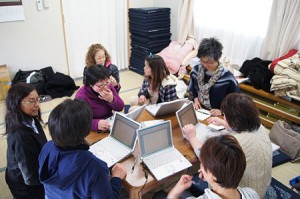After a series of workshops on the importance of effective communication from women in disaster areas in Tohoku, the Rise Together Media Team reached its first goal—completed short reports written neatly and accompanied with photos– in February. In fact, there were a lot of “First Time” achievements to mark the first anniversary of the Great East Japan Disaster that struck the northeastern coasts on March 11, 2011.
 Lets take the first cause for applause—Women living in temporary housing have started to use cameras and computers to write their stories, an experience they had not even dreamed about before. Loud and infectious chuckles broke the silence during the workshops as the group concentrated in mastering the key-boards on their new computers. “This is difficult but I am never going to give-up,” said Ms. Naoko Watanabe. The efforts of Ms. Shoko Abe, mother of two, sent loud guffaws through the room when she typed the wrong letters but then got it right. Abe was participating for the first time in the media workshop, driving almost an hour from her temporary shelter in Natarie to reach the venue. She arrived with Ms. Mayumi Abe, who had lost her mother during the tsunami and continues to search for the body. The short epistles written by the women from Minami Sanriku appeared on the screen slowly, each timid hit on the key- board representing giant steps ahead in the female world in Tohoku where communication of thoughts, emotions and opinions have been dominated by their male counterparts. Resigned to the social conservatism, women in the group explained their pre-disaster daily lives had been consumed with daily work with their husbands who relied on their wives to sustain individual fishing and seaweed cultivation that provided the family income. Now, a year later after the massive disaster that wiped away their belongings and jobs, the lives of women have changed drastically. With more time on their hands as they wait for their husbands to regain collapsed businesses, the women have begun to make time to learn new skills such as photography or writing. Knitting pretty clothes has also become a popular past-time among women in temporary housing. “ I finally have time to feel feminine” explained Watanabe proudly displaying a beautiful hat and matching gloves, the result of her hard work at home. Since she married several years ago, Watanabe used to start her day at 3 am when she work up to accompany her husband in the fishing boat that took them far into the sea to lay nets for cultivating seaweed. The days would pass quickly for her as she juggled work, household chores and looking after the children. That daily schedule has changed now. “It is a special occasion to be able to have lunch out, something I had never done before the disaster because I was very busy with work every day,” wrote Mayumi on her computer, revealing in her message an important change in her life in Minami Sanriku.
Lets take the first cause for applause—Women living in temporary housing have started to use cameras and computers to write their stories, an experience they had not even dreamed about before. Loud and infectious chuckles broke the silence during the workshops as the group concentrated in mastering the key-boards on their new computers. “This is difficult but I am never going to give-up,” said Ms. Naoko Watanabe. The efforts of Ms. Shoko Abe, mother of two, sent loud guffaws through the room when she typed the wrong letters but then got it right. Abe was participating for the first time in the media workshop, driving almost an hour from her temporary shelter in Natarie to reach the venue. She arrived with Ms. Mayumi Abe, who had lost her mother during the tsunami and continues to search for the body. The short epistles written by the women from Minami Sanriku appeared on the screen slowly, each timid hit on the key- board representing giant steps ahead in the female world in Tohoku where communication of thoughts, emotions and opinions have been dominated by their male counterparts. Resigned to the social conservatism, women in the group explained their pre-disaster daily lives had been consumed with daily work with their husbands who relied on their wives to sustain individual fishing and seaweed cultivation that provided the family income. Now, a year later after the massive disaster that wiped away their belongings and jobs, the lives of women have changed drastically. With more time on their hands as they wait for their husbands to regain collapsed businesses, the women have begun to make time to learn new skills such as photography or writing. Knitting pretty clothes has also become a popular past-time among women in temporary housing. “ I finally have time to feel feminine” explained Watanabe proudly displaying a beautiful hat and matching gloves, the result of her hard work at home. Since she married several years ago, Watanabe used to start her day at 3 am when she work up to accompany her husband in the fishing boat that took them far into the sea to lay nets for cultivating seaweed. The days would pass quickly for her as she juggled work, household chores and looking after the children. That daily schedule has changed now. “It is a special occasion to be able to have lunch out, something I had never done before the disaster because I was very busy with work every day,” wrote Mayumi on her computer, revealing in her message an important change in her life in Minami Sanriku.
The second cause célèbre was achieved in the morning session of the workshop and the heroine was Ms Fumie Abe. Abe was living close to the coast in Togura vicinity with her family and in-laws when the massive tsunami struck. They escaped in time but their house and belonging were swept away. The experience left her with a huge sense of loss. Later, she joined the workshops that taught her to capture these emotions through new photography and writing skills. The big day arrived, a year later, when she decided to take to the devastated site that was once her former home. The assignment was suggested by the media team instructors and while the others in her group declined, she decided to move ahead boldly. Ms Abe stood on the concrete foundation of her home watching the devastation around her and noting that soon after the disaster she did not dare visit the place when she was consumed by fear. “ But, today has been all about change. One year later, I am going ahead in my life and its time for some strong decision-making,” she wrote.
Ms Abe`s decision has been a symbol of strength for her friends and colleagues who have joined the media activities. The importance of recording has raised its profile among women and they face the important challenge of facing their losses again. “One year later marks a journey from the time when we could heal by turning our backs on sorrow to facing it squarely and then moving ahead. It’s a difficult test because the losses we have experienced continue to be devastating on an individual basis. But the time has come to make the effort,” said Ms Watanabe.
Kakuchi Suvendrini
